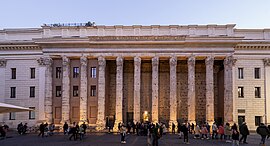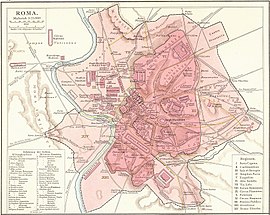 A surviving side colonnade of the Temple of Hadrian. | |
 Click on the map for a fullscreen view | |
| Coordinates | 41°53′59″N 12°28′46″E / 41.89972°N 12.47944°E |
|---|---|
The Temple of Hadrian (Templum Divus Hadrianus, also Hadrianeum) is an ancient Roman structure on the Campus Martius in Rome, Italy, dedicated to the deified emperor Hadrian by his adoptive son and successor Antoninus Pius in 145 CE[1] This temple was previously known as the Basilica of Neptune but has since been properly attributed as the Temple of Hadrian completed under Antoninus Pius.[2] With one cella wall and eleven columns from the external colonnade surviving, the remains of the temple have been incorporated into a later building in the Piazza di Pietra (Piazza of Stone – derived from use of the temple's stones to build the piazza), whereby its facade, alongside the architrave which was reconstructed later on, was incorporated into a 17th-century papal palace by Carlo Fontana, now occupied by Rome's Chamber of commerce. While only part of the structure remains, excavations and scholarship have provided us with information regarding its construction techniques and stylistic influences, helping us recreate the building dynamics and significance of the Temple of Hadrian in Imperial Rome.
- ^ Historia Augusta. 8.2.
- ^ Richardson, Lawrence (1992). A New Topographical Dictionary of Ancient Rome. Baltimore: Johns Hopkins University Press. pp. 237. ISBN 9780801843006.

